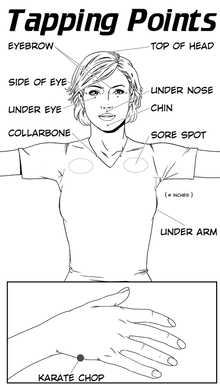|
From the moment I first stumbled across Emotional Freedom Techniques (also known as EFT or 'Tapping") back in 2010 I was hooked. To this day I remain super passionate about it and continue to be amazed at the life-changing results that are achieved. So, what is EFT? EFT or Emotional Freedom Techniques (also known as Tapping) is an evidenced based technique that involves lightly tapping with your fingertips on specific acupressure points (see diagram below) on the face, upper body and side of the hand, while focusing on a negative issue, memory or feeling. Tapping in this way sends a calming signal to the brain which in turn helps to calm the body and nervous system. The result is you can think about the same issue or memory and it will no longer feel stressful and no longer creates the same stress responses in the body. Although still considered relatively new, EFT has been around for more than 40 years and researched for more than 20 years. “EFT has been researched in more than 10 countries, by more than 60 investigators, whose results have been published in more than 20 different peer-reviewed journals”. Peta Stapleton, Psychologist and Researcher, Bond University Effectiveness has been established in addressing a wide range of issues including phobias, anxiety, depression, post-traumatic stress disorder, chronic pain, food cravings and weight management. EFT has been clinically proven to positively affect the body in relation to blood pressure and brain activity and to lower the stress hormone cortisol in the body. EFT can assist people from all walks of life and can be used with children as young as 3-4 years of age. So how does it work? Unprocessed stressful emotions are at the core of many physical and psychological symptoms. Unfortunately, we are often taught to resist and push down these painful emotions instead of feeling or expressing them. And in situations of trauma there often isn’t the time or opportunity or often the knowledge to process what has occurred. At these times the body actively pushes down emotions so that you can get on with everything you need to do in your life. However, these unprocessed emotions stay in the body until there is the opportunity to process them. It doesn't matter if the stressful event occurred last week or twenty years ago - if the emotions weren't processed, there remains an imprint of those emotions in the body. When you provide the body with a way to express and release these emotions the body starts feels calmer and is able to function more effectively. Enter EFT. EFT has a positive effect on the body’s stress response (commonly known as the fight/flight response) and actually changes how your brain responds to stressful issues or events. It works both in relation to current issues as well as issues that have happened in the past. The basic tapping process involves focusing on a stressful experience or issue while using the fingertips to tap on specific acupressure points. Tapping in this way sends a calming signal to the brain, letting it know it is safe. So even though you have this stressful issue or feeling, your brain begins to stop seeing it as such a threat. This enables the body to to relax and you can think about the issue or event without having the same stress response. The most common feedback I hear people say at the end of EFT sessions are they feel calmer and more relaxed, the issue they came in with doesn’t feel like so much of an issue anymore, and if they came to the appointment with questions about their life, or areas of confusion, they generally feel clearer about what has happened and what to do next. How long does it take to work? This will depend on the issues being addressed. Some issues can be resolved in one or two sessions. It has been my experience that most people notice a significant difference in how they feel within the first appointment. There is often an emotional release as the body starts to relax. However, if there are layers related to multiple stressful events and/or traumas it will take longer to address. Care needs to be taken in addressing trauma that the person does not become overwhelmed. Fortunately, Clinical EFT provides many avenues to avoid this. A suitably trained therapist will understand how to approach trauma in a way that is safe and supportive. Should i try EFT on my own or with a Practitioner? EFT is an amazing self-help tool that can be used in addressing many day-to-day stressors once you understand the basic tapping technique. There are however times when it is beneficial and advisable to engage the help of a suitably trained therapist or counsellor. Your brain is incredibly effective at keeping you safe. It is what has kept the human species alive and evolving for so long. So, if you go delving into painful memories or experiences, chances are your brain will do its utmost to distract you away from it. And sometimes for good reason! Going back to traumatic memories can be overwhelming. For this reason, when it comes to addressing traumatic memories, that you know may feel overwhelming, being supported by a suitably trained trauma-informed EFT Practitioner can help you navigate those painful feelings and emotions. Additionally, trained EFT Practitioners will have a range of different ways to approach an issue or concern beyond the basic tapping process. If you are interested in finding out more about the science and research behind EFT, click on the links below: If any of the above information has been helpful please consider passing it onto someone else who may benefit. Until next time, Karen Northey
Counsellor (Trauma informed) EFT Practitioner (Emotional Freedom Techniques) Social Worker Website: www.connexionscounselling.com Email: [email protected]
0 Comments
Leave a Reply. |

